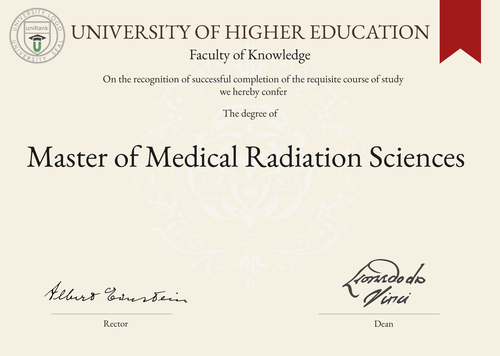
Master of Medical Radiation Sciences (M.M.R.S.)
Guide to Master of Medical Radiation Sciences Program/Course/Degree
Master of Medical Radiation Sciences (M.M.R.S.)

Program Name:
Master of Medical Radiation SciencesProgram or Degree abbreviation:
M.M.R.S.Duration range:
Varies by country and university, typically 2-3 yearsTuition range:
Varies by country and university, typically $10,000-$30,000 per yearOverview:
The Master of Medical Radiation Sciences program is designed to provide advanced knowledge and skills in medical imaging, radiation therapy and nuclear medicine. It prepares students to become highly skilled professionals in the field of medical radiation sciences.Curriculum Overview by year:
- Year 1: Core courses in medical imaging, radiation therapy and nuclear medicine, as well as research methods and ethics. - Year 2: Specialized courses in advanced imaging techniques, treatment planning, radiation safety and clinical practice. - Year 3 (if applicable): Research project or clinical placement.Key Components:
- Medical Imaging: Focuses on the use of various imaging techniques such as X-rays, CT scans, MRI and ultrasound to diagnose and treat diseases. - Radiation Therapy: Involves the use of high-energy radiation to target and destroy cancer cells. - Nuclear Medicine: Utilizes radioactive substances to diagnose and treat diseases at a molecular level.Career Prospects:
Graduates of the Master of Medical Radiation Sciences program can pursue careers as: - Radiographers - Radiation therapists - Nuclear medicine technologists - Medical imaging researchers - Clinical educatorsSalary Expectations:
Salaries for professionals in the field of medical radiation sciences can vary depending on factors such as experience, location and specialization. On average, radiographers earn around $60,000-$80,000 per year, while radiation therapists and nuclear medicine technologists earn $70,000-$90,000 per year. For a more accurate understanding of salary expectations, you can utilize the Job Sites Search Engine, from our sister site jobRank, which searches over 4,600 job sites worldwide. Make sure to specify not only the job title but also the country you are interested in.Conclusions:
It is important to note that the duration, tuition fees, curriculum, key components, career prospects and salary expectations of the Master of Medical Radiation Sciences program can vary depending on the country or location where you choose to study, as well as the university you select. Visitors interested in pursuing this degree are encouraged to use the uniRank World Universities Search Engine to find institutions offering the Master of Medical Radiation Sciences program worldwide.World Universities Search Engine
search for Master of Medical Radiation Sciences (M.M.R.S.) and add the Location (country, state etc.) or specific University you are interested in studying at.
Query examples:
- Master of Medical Radiation Sciences (M.M.R.S.) United States
- Master of Medical Radiation Sciences (M.M.R.S.) United Kingdom online
- Master of Medical Radiation Sciences (M.M.R.S.) Australia international students
- Master of Medical Radiation Sciences (M.M.R.S.) University of California
- Master of Medical Radiation Sciences (M.M.R.S.) University of London tuition fees
- Master of Medical Radiation Sciences (M.M.R.S.) University of Sydney scholarships
Share Program/Course
Interesting? Share this program/course/degree info with your friends now.